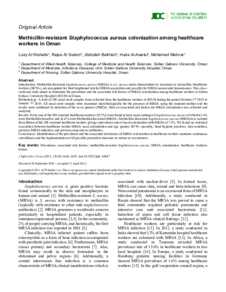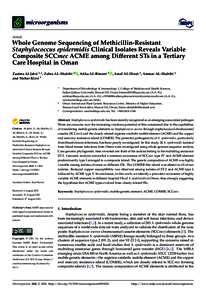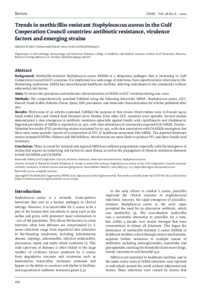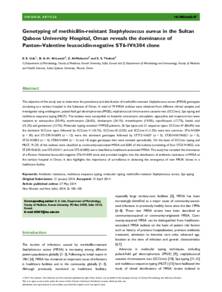وثيقة
Methicillin-resistant staphylococcus aureus colonization among healthcare workers in Oman.
المعرف
DOI: 10.3855/jidc.14047
المصدر
Journal of Infection in Developing Countries. v. 15, 10, p. 1426-1435
المساهمون
Al-Sudairiyah. Rajaa., مختصر
Balkhair, Abdullah. , مؤلف
Al-Awaisiyah, Huda., مؤلف
Mabruk, Mohamed., مؤلف
الدولة
Italy
مكان النشر
rome
الناشر
Journal of Infection in Developing Countries.
ميلادي
2021-10-01
اللغة
الأنجليزية
الملخص الإنجليزي
Introduction: Methicillin-Resistant Staphylococcus aureus (MRSA) is a S. aureus strain characterized by resistance to cloxacillin. Healthcare workers (HCWs), are recognized for their heightened risk for MRSA acquisition and possibly for MRSA nosocomial transmission. This cross-sectional study aimed to determine the prevalence and the associated risk factors of MRSA colonization among healthcare workers at Sultan Qaboos University Hospital (SQUH) in Oman. Methodology: A total of 200 nasal swab samples were collected from the healthcare workers at SQUH during the period October 2nd 2018 to January 7th 2019. All nasal swab samples were examined microbiologically for the presence of MRSA using the standard method and the results were confirmed by detection of the mecA product (PBP2a). Data on associated risk factors for MRSA colonization was collected and analyzed. Results: Forty-one of the 200 screened healthcare workers (20.5%) were found to have nasal carriage of Staphylococcus aureus of which 63.4% were Methicillin Sensitive and 36.6% were Methicillin-Resistant (MRSA). Methicillin-Resistant Staphylococcus aureus (MRSA)was isolated from fifteen of the 200 screened healthcare workers giving a prevalence rate of nasal colonization with MRSA of 7.5%. We found no statistical association between healthcare worker MRSA nasal colonization and age, gender, HCWs specialty, hand hygiene practices, skin condition, previous MRSA infection, and previous exposure to antibiotics. Conclusions: Identification of the prevalence and the associated risk factors of MRSA colonization in healthcare workers mandates continuous surveillance and the implementation of all possible preventive measures to reduce re-occurrences.
ISSN
2036-6590
قالب العنصر
مقالات الدوريات





